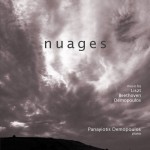Panayiotis Demopoulos (piano)
Diversions ddv24142
TTP: 58:00
reviewed by Neville Cohn

Liszt: Nuages gris; La lugubre gondola 1; Unstern; Vallee d’Obermann
Beethoven: Piano Sonata No 30 in E, opus 109
Demopoulos: Terakyts for solo piano
Photo Credit: P.Demopoulos/Divine Art
I have long ago lost count of the number of performances – both live and recorded – I have listened to of Beethoven’s Sonata in E, opus 109. Many of them have been presentations of sterling worth, not least the recording Dame Myra Hess, late in life, put down on HMV 78rpm discs. Even though she was by then past her prime, the chief joy of that long-ago performance was the poetic quality that suffused so much of the recording.
Panayiotis Demopoulos’ account calls that of Dame Myra to mind; its first movement, too, often has a poetic, extemporaneous quality that lifts it into a high category of excellence. With notes clothed in golden tone, dramatic outbursts and lyrical contemplation are finely contrasted. Certainly, the sensitivity with which Demopoulos employs rubato here is exemplary. And the toughly assertive manner and unflagging momentum that informs the prestissimo movement comes across impressively.
In the first of the variations which comprise the finale, Demopoulos maintains a sense of onward momentum at very slow speed; it’s a remarkable feat of musicianship. In Variation 2, staccato notes, like winking lights, call pointillism to mind. Nimble, sure fingers make light of the difficulties posed by Variation 3. Calmly reflective playing in Variation 4 gives way to impeccable contrapuntal, bright-toned playing. And extended, finely spun trills radiate calmness in Variation 6; it’s a tour de force.
Much of the opening movement of opus 109 has a dreamlike, extemporaneous quality and that is even more apparent in much of a bracket of four too-seldom-heard works by Liszt. Because none of these could be thought of as crowd-pleasers as, say, some of the Hungarian Rhapsodies or etudes are, they are seldom aired. More’s the pity because they enshrine some of the composer’s most memorable musical thoughts.
Beautifully controlled tremolo emphasises the bodeful, rather sinister quality of Nuages gris (Grey Clouds) – and the melancholy essence of La lugubre gondola 1 is masterfully evoked. Eerily, a month after Liszt wrote this funeral piece, Richard Wagner (with whom Liszt was staying at the time in Venice) died and was borne from his last home on just such a vessel. Here, too, Demopoulos shapes to the stylistic and physical demands of the music like wine to a goblet. This is equally apparent in Unstern (Evil Star) in which insistent, imperious, stark utterances call Liszt’s much better known Funerailles to mind. Demopoulos clearly identifies with the piano music of Liszt – and no more so than in Vallee d’Obermann. Here, too, Demopoulos plays as if to the manner born, evoking the introspective, desolate, forsaken essence of the music. It is a tour de force.
In Taraktys, we hear Demopoulos as both composer and pianist in the four variations that comprise the work, the first dramatically dense-textured, with darting arabesques and simulation of a tolling bell, the second heavy-toned with massive blocks of tone hurling from the speakers. Variation three is softly dissonant and introspective, the fourth and final variation encompassing delicate arabesques



